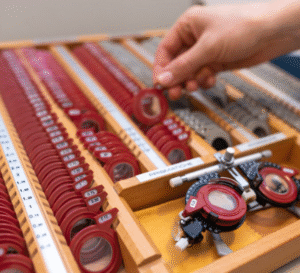What it is
Recurrent miscarriage is defined as two or more consecutive pregnancy losses before 20 weeks of gestation. It is a heartbreaking condition that affects about 1–2% of couples trying to conceive.
✔️ Types:
- Early miscarriage – usually before 12 weeks.
- Late miscarriage – between 12–20 weeks.
✔️ Causes may include genetic, anatomical, hormonal, immunological, or lifestyle factors.
➡️ In Korea, recurrent miscarriage evaluation is carried out at fertility centers, women’s hospitals, and university hospitals, combining advanced testing with supportive counseling.
Why it’s done
Evaluation is critical because it:
🔹 Identifies underlying causes of repeated pregnancy loss.
🔹 Guides treatment to improve chances of a healthy pregnancy.
🔹 Prevents repeated trauma by offering a targeted care plan.
🔹 Supports emotional well-being by providing answers and reassurance.
🔹 Protects maternal health, especially if miscarriages were complicated.
💡 Highlight: Proper evaluation can transform uncertainty into a personalized roadmap for future pregnancy success.
Alternatives
Some couples may choose alternatives before or during evaluation:
➡️ Waiting and trying again naturally – though repeated losses without evaluation can be risky.
➡️ Adoption – for couples unable or unwilling to pursue further pregnancy attempts.
➡️ Donor eggs or sperm – if genetic issues are found.
➡️ Embryo adoption – using pre-screened embryos.
➡️ Traditional Korean medicine – acupuncture and herbal remedies to strengthen reproductive health.
⚠️ Note: While supportive, these alternatives cannot replace medical evaluation in couples with recurrent miscarriages.
Preparation
Before starting recurrent miscarriage evaluation in Korea, preparation typically includes:
✔️ Detailed reproductive history – number, timing, and type of miscarriages.
✔️ Medical history – chronic illnesses, surgeries, or infections.
✔️ Family history – genetic disorders, autoimmune conditions.
✔️ Lifestyle review – smoking, alcohol, stress, and occupational risks.
✔️ Gathering medical records – ultrasound reports, pathology results from past miscarriages.
💡 Tip: Korean doctors encourage couples to bring all previous test results for faster and more accurate evaluation.
How it’s done
Recurrent miscarriage evaluation in Korea is a comprehensive and stepwise process:
- Genetic evaluation
- Karyotype testing of both partners.
- Genetic testing of miscarriage tissue if available.
- Anatomical assessment
- Pelvic ultrasound, hysterosalpingography (HSG), or hysteroscopy to check for uterine abnormalities (fibroids, septum, adhesions).
- Hormonal testing
- Thyroid function, prolactin, ovarian hormones, and luteal phase adequacy.
- Immunological and blood clotting tests
- Screening for antiphospholipid syndrome, lupus anticoagulant, and other clotting disorders.
- Infectious disease screening
- Tests for chronic infections that may contribute to miscarriage.
- Lifestyle and systemic health evaluation
- Diabetes, obesity, hypertension, and nutritional deficiencies checked.
💡 Highlight: Korean clinics combine advanced laboratory testing with high-resolution imaging, ensuring no potential cause is overlooked.
Recovery
Since evaluation itself involves diagnostic testing, there is no physical recovery needed. Emotional recovery, however, is vital:
✔️ Counseling support is often offered, as miscarriage evaluation can be emotionally draining.
✔️ Results discussion – doctors provide treatment strategies after all results are reviewed.
✔️ Personalized care plan – addressing identified causes (e.g., surgery for uterine septum, medication for clotting disorders, IVF with genetic screening for chromosomal issues).
When to revisit a doctor:
➡️ If another miscarriage occurs despite treatment.
➡️ If new health conditions develop (thyroid issues, autoimmune symptoms).
➡️ For preconception counseling before trying again.
💡 Important: Korean clinics emphasize compassionate follow-up care, supporting both physical and emotional recovery.
Treatment option in Korea
Korea offers world-class options for recurrent miscarriage evaluation and treatment:
⭐ University hospitals and fertility centers with advanced genetic and immunological labs.
⭐ Hysteroscopy and minimally invasive surgery to correct uterine abnormalities.
⭐ IVF with preimplantation genetic testing (PGT) to select healthy embryos.
⭐ Holistic programs combining modern medicine with traditional Korean therapies.
⭐ Multilingual services for international patients.
💡 Highlight: Korea’s fertility care system is advanced, affordable, and highly personalized, making it a strong destination for recurrent miscarriage evaluation.
Key Highlights
✔️ Recurrent miscarriage is defined as two or more consecutive pregnancy losses.
✔️ Causes include genetic, anatomical, hormonal, immune, and lifestyle factors.
✔️ Evaluation in Korea involves genetic tests, imaging, hormone panels, and clotting studies.
✔️ Recovery focuses on emotional support and treatment planning.
✔️ Korean clinics offer advanced, affordable, and compassionate care for couples experiencing recurrent pregnancy loss.













